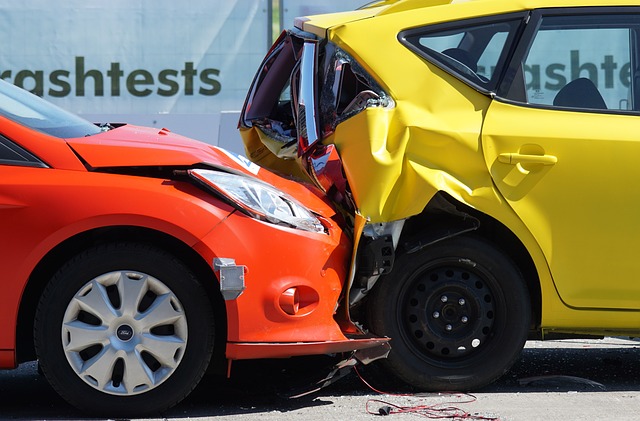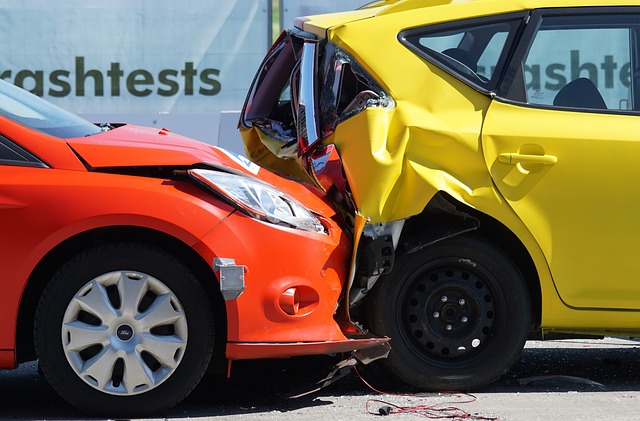Collision insurance is an essential part of car insurance that covers vehicle damage from accidents involving other cars, objects, or varied terrain, regardless of fault. It's particularly important for those leasing or financing their vehicles to protect the lender's investment. When your repair costs exceed your deductible, collision insurance steps in, covering the rest up to your car's value or offering a settlement if it's a total loss. Older cars with lower repair costs might not require as much coverage, while newer or high-value vehicles may benefit from higher coverage limits to protect against costly repairs. Drivers should regularly review their policy to ensure it aligns with their vehicle's value and the risks they face, balancing the need for financial protection with insurance premiums. Considering the costs of potential accidents versus the cost of insurance, drivers must decide if collision coverage is a worthwhile investment based on their individual circumstances, driving habits, and the value of their car. Ultimately, it's a personal decision that should be revisited as vehicle conditions change or as personal financial situations evolve.
Whether navigating the roads as a seasoned driver or venturing forth for your first time behind the wheel, a pivotal decision awaits: understanding the scope of collision insurance and its value in safeguarding against costly accidental damages. This article delves into the intricacies of collision coverage, offering clarity on what it entails and why it’s a prudent investment for your financial well-being. We’ll explore the differences between collision and comprehensive policies, assess their cost implications, and share real-world examples where this coverage has proven its worth. Additionally, we’ll guide you through customizing your policy to meet your unique needs, ensuring you make an informed decision about your vehicle’s protection.
- Understanding Collision Insurance: Essentials and Protection
- Collision vs. Comprehensive: What's the Difference?
- Cost Analysis: Assessing the Value of Collision Coverage
- Real-Life Scenarios: When Collision Insurance Pays Off
- Policy Customization: Tailoring Your Coverage to Your Needs
- Making an Informed Choice: Weighing the Pros and Cons of Collision Insurance
Understanding Collision Insurance: Essentials and Protection

Collision insurance is a critical aspect of your auto insurance policy, designed to protect your vehicle from damages resulting from collisions with other vehicles, objects, or terrain, regardless of fault. This coverage typically kicks in when the cost to repair your car exceeds a specific deductible amount you’ve agreed upon. It’s important to note that collision insurance is particularly valuable for those who lease or finance their vehicle, as it ensures that the lender’s investment is protected. For owners of older vehicles, assessing the value of this coverage is crucial; if the cost to insure is close to the car’s worth, you might opt for a higher deductible to lower premiums. On the other hand, drivers of newer or more expensive models may benefit from lower deductibles to mitigate the significant repair costs that can arise from even minor accidents. With collision insurance, you are safeguarded against out-of-pocket expenses for vehicle repairs after an accident, providing peace of mind on the road and financial security in the event of an incident.
Collision vs. Comprehensive: What's the Difference?

Collision insurance and comprehensive insurance are both types of coverage that help protect your vehicle from different types of damage, but they safeguard against distinct scenarios. Collision insurance specifically covers damage to your vehicle when it collides with another object, such as another car, a stationary item like a light post, or a terrain feature like a ditch. This coverage kicks in regardless of who is at fault in the accident. On the other hand, comprehensive insurance addresses damages caused by non-collision events, including theft, vandalism, natural disasters like hail or floods, and animal collisions. It’s important to understand that while both types of insurance are designed to protect your vehicle, they cater to different risks. Drivers should evaluate their personal risk factors, the value of their vehicle, and the likelihood of certain events occurring in their area when deciding whether collision or comprehensive coverage—or both—is right for them. Given the varied nature of these coverages, it’s advisable to review your policy regularly to ensure it aligns with your current driving situation and the level of protection you desire.
Cost Analysis: Assessing the Value of Collision Coverage

When evaluating the value of collision coverage, a cost analysis is paramount. This involves understanding both the potential costs of repairs or replacement after an accident and the premiums associated with collision insurance policies. The extent of your vehicle’s value, the likelihood of it being involved in an accident, and the deductible you’re willing to pay are all critical factors in this assessment. For instance, if you own a newer car with higher repair costs, collision coverage can be particularly valuable as it ensures that you’re not left to shoulder expensive bills should you be at fault in an accident. On the other hand, if your vehicle is older and less costly to fix or replace, you might find that the premiums for collision insurance outweigh the potential repair costs, making it a less critical component of your policy. It’s essential to weigh these factors against the financial resources you have available. If self-insuring seems too risky due to your vehicle’s value and your financial situation, then investing in collision coverage could be a prudent decision to protect your assets and peace of mind. Additionally, consider the financial impact of an at-fault accident on your overall budget, including potential increases in insurance premiums following an incident. By carefully analyzing these costs and how they align with your financial situation, you can make an informed decision about whether collision coverage is a worthwhile investment for your specific circumstances.
Real-Life Scenarios: When Collision Insurance Pays Off

Considering the unexpected nature of road incidents, collision insurance serves as a financial buffer when your vehicle sustains damage in an accident, regardless of fault. For instance, imagine a scenario where a driver, perhaps due to sudden braking or adverse weather conditions, rear-ends another car on a busy highway. The cost of repairs for both vehicles can be substantial. In this case, collision insurance would cover the repairs for the insured’s vehicle, potentially saving the driver from a hefty out-of-pocket expense. Another real-life scenario involves a driver whose car flips over after losing control on a curvy road. The result could be extensive damage to the vehicle that might exceed its actual cash value. Here, collision insurance would either cover the cost of repairs up to the car’s value or provide a settlement for the total loss, allowing the driver to move forward without the burden of a significant financial hit. These examples underscore the value of collision insurance as a prudent investment, especially in light of the rising costs associated with vehicle repairs and the unpredictability of road conditions. It’s a safeguard that can provide peace of mind, knowing that you have protection in place for those ‘what if’ moments on the road.
Policy Customization: Tailoring Your Coverage to Your Needs

When tailoring your collision insurance policy, it’s crucial to consider the specifics of your vehicle and your driving habits. For instance, if you own a car that’s particularly expensive to repair or replace, you might opt for higher coverage limits to ensure adequate protection. On the other hand, if you drive an older model with lower value, you may choose a policy with lower deductibles and coverage ceilings, reflecting the cost of repairs. Additionally, the location where you park your vehicle plays a significant role in determining your risk level; urban environments with higher traffic volume typically necessitate more comprehensive collision coverage compared to less congested areas. It’s also wise to evaluate your financial situation and consider how much you can afford to pay out of pocket should you file a claim. By carefully assessing these factors, you can customize your policy to align with your vehicle’s worth, potential repair costs, personal financial circumstances, and the inherent risks associated with your driving environment, thereby creating a collision insurance plan that’s both economically sound and tailored to your individual needs. This level of customization ensures that drivers have the coverage they need without overpaying for benefits that don’t align with their specific situation.
Making an Informed Choice: Weighing the Pros and Cons of Collision Insurance

When evaluating whether collision insurance is a worthwhile investment, it’s crucial to examine both its advantages and potential drawbacks. Collision coverage steps in when your vehicle collides with another object—regardless of fault. It can cover the cost of repairs or, if your car is beyond repair, its actual cash value as a total loss. This protection is particularly valuable for those who lease or finance their vehicles, as lenders typically require this coverage to ensure the asset is protected. However, it’s not without costs; premiums for collision insurance can be significant, and they tend to rise with the value of your vehicle. Therefore, drivers must assess their individual risk factors: how often they drive, the likelihood of an accident in their area, the make and model of their car, and its replacement cost. For those who drive frequently or own a higher-value vehicle, the benefits of collision insurance can far outweigh the costs, offering peace of mind that can be priceless should an incident occur. Conversely, if your vehicle is older and less expensive to replace or repair, you might decide that the premiums for collision coverage are not justified. It’s a personal decision that should be made after careful consideration of your financial situation, the value of your car, and your driving habits. By fully understanding what collision insurance covers, its cost versus benefits, and how it complements other types of auto insurance, you can make an informed choice tailored to your specific needs on the road.
When it comes to collision insurance, drivers at all levels can benefit from its protective umbrella. This article has demystified the coverage, highlighting its role in mitigating financial risks associated with vehicular mishaps. By examining the distinctions between collision and comprehensive policies, assessing the cost implications, and reviewing real-life instances where collision insurance proved its worth, drivers can make an informed decision about their coverage needs. Tailoring your policy to align with your specific circumstances ensures that you are neither over nor underinsured. As the road ahead is unpredictable, securing collision insurance can be a prudent step towards safeguarding your vehicle and financial well-being, especially given the escalating costs of repairs. In light of this comprehensive analysis, investing in collision insurance seems not just an option, but a wise choice for any driver looking to navigate the open road with confidence.



